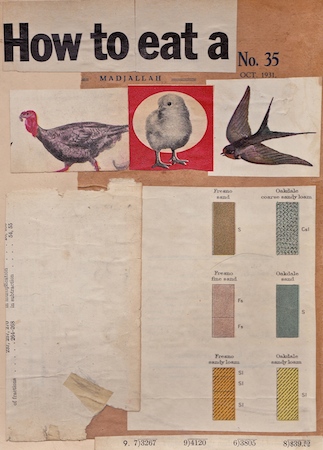 I have been to the end of the world. I was fourteen on a fall morning, frost icing the dead grass in the yard, my feet cold on the tile. The phone rang from under dishes and papers on the kitchen table, and I let my mother get it. She answered, said okay, hung up. That quick, she sold me off.
I have been to the end of the world. I was fourteen on a fall morning, frost icing the dead grass in the yard, my feet cold on the tile. The phone rang from under dishes and papers on the kitchen table, and I let my mother get it. She answered, said okay, hung up. That quick, she sold me off.
“The neighbor’s chicken house burned down. Wants the kids to help clean up. Says he’ll pay you.”
I’d spent summers beating nails out of scrap wood, burning and raking old lumber, sweeping clean the dead ground. My hands knew splinters. To do for pay what I’d always done for bread, this seemed a good reason to dress early in the cold. I laced my heavy boots, the most expensive shoes I owned, good for church or walking through winter-wet both.
Can’t remember the pinch-faced man that picked me up, but I’d bet money he drove a truck without a tailgate. He lived miles off, a man whose property I had never seen and whose name I never learned. He knew me through school young or church old. Our town was a small place held together by gossip and blood, and being newcomers, we were worth talking about.
He dropped me off near the other kids, in the pasture around the smoking skeleton of the chicken house. I vaguely knew them from school. As one of the older ones, and maybe because I stood off alone, I was given my own garbage bag and pair of gloves. We walked inside, its black and heat, its pure burnt smell.
Gray light came through the pocked walls and roof, the beams char-black. The ground was like snow, but black and thick, and I plowed my boots through ash. The place was full of dead chickens, burned feather-free and limbless, piled up like stones. Breaths of smoke came from the football-shaped bodies. They lay there like hail, like they had fallen.
We picked up dead chickens and tossed them at each other, laughing. When the birds hit, their bodies cracked apart. We bent to our knees and prodded in them with our fingers. The meat was cooked through in most, gray and hot. Whistled when you held your ear to it. We put them to our noses and breathed in the chicken smell, a deli odor mixed with cigarettes. It made us cough and our stomachs growl, mixing up hungry and sick. We dared each other to eat. Some of us did.
I filled my garbage sack with dead chickens, with pieces of dead chickens that crumbled in my hands, with black lumps that could have been animal or wood. Stacked my bag with the others outside, to be hauled off and dumped somewhere. I gummed up my hands, the char thick and hot like asphalt. It covered my good boots, fouled the laces, welded death to the soles.
After it was done, a man walked around handing out bills. After losing chickens and house, he had to lose more money to pay for cleanup. I was given maybe ten dollars. At home later, I tried to hose my boots off, to scrape them clean with a pocketknife. Their color had changed, gray to the root, and they stank of meat. There was no cleaning them, fifty-dollar pair of boots, so I threw them away.
In the old stories, when people leave home and come back shoeless, it means they passed to the land of the dead and returned. Achilles dipped in the Styx, Cinderella dancing with Hades, Jesus Christ getting his feet punched on his way to the gates of Hell. There’s always money to lose in those stories, hood-wrapped Charon fingering his coins, Judas palming his silver.
Know then that when your world ends and you go into the grave, you will be a stranger there. But take heart. It’s nothing you aren’t familiar with. You will clock in, do your work, and collect your pay. You will stand barefooted, pockets empty, ash on your tongue.
__
Micah Dean Hicks is an assistant professor in the B.F.A. program in creative writing at Arkansas Tech University. His work has appeared in Chicago Tribune, Witness, New Letters, Indiana Review, and New Orleans Review, among others. He is the author of the fabulist story collection, Electricity and Other Dreams.

4 comments
Nonfiction: “Arkansas Chicken Apocalypse” Write Up by Olivia Cardenas | the pva creative writing review says:
Sep 17, 2015
[…] “Arkansas Chicken Apocalypse,” by Micah Dean Hicks, it is evident that all humans are controlled by money. This obsession with […]
Kenny A. Chaffin says:
Sep 21, 2015
Nice. I like it.
Keiko O'Leary says:
Jan 1, 2016
I enjoyed this. I especially appreciated the mythological connections. Thank you!
A.L. says:
Dec 11, 2024
Okay, I’m just gonna say it: that was actually really cool.